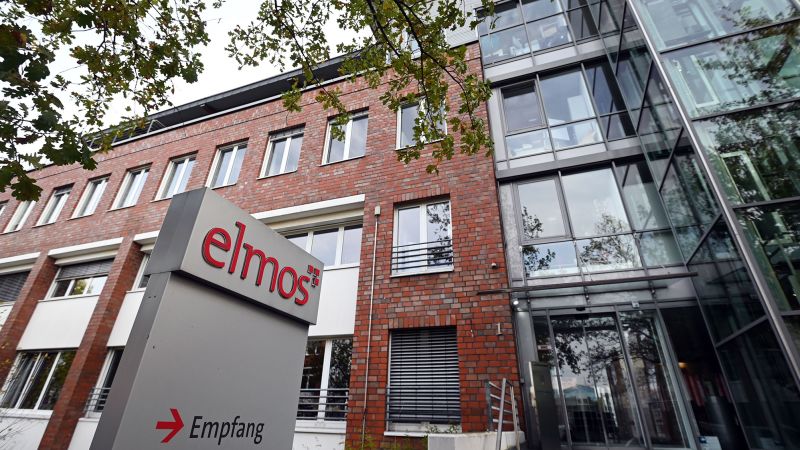Germany blocks sale of chip factory to China over security fears | CNN Business
London/Berlin
CNN Business
—
The German government has blocked the sale of one of its semiconductor factories to a Chinese-owned tech company because of security concerns.
Germany’s economic ministry said in a statement that it had prohibited Elmos Semiconductor, which makes chips for the automotive industry, from selling its factory in Dortmund to Silex, a Swedish subsidiary of China’s Sai Microelectronics.
The decision had been taken “because the acquisition would have endangered the public order and safety of Germany,” the ministry said in a statement.
Silex announced in December that it had signed an agreement with Elmos to buy the factory for €85 million ($85.4 million).
Silex did not immediately respond to CNN Business’ request for comment. Elmos said in a statement that both companies regretted the government’s decision.
“The transfer of new micromechanics technologies … from Sweden and significant investments in the Dortmund location would have strengthened semiconductor production in Germany,” Elmos said, adding that it was considering whether to take legal action.
Sia Microelectronics said in a statement Thursday that it “deeply regretted” the decision by the German government. Its shares fell more than 9% in Shenzhen.
“We have to take a close look at company acquisitions when important infrastructure is involved or when there is a risk of technology flowing to acquirers from non-EU countries,” German economy minister Robert Habeck said at a press conference.
He added that the semiconductor industry in Europe, in particular, needed to guard its “technological and economic sovereignty.”
The planned deal had rattled German authorities concerned that Chinese investment in its critical infrastructure could compromise its intellectual property and leave it exposed to political pressure from Beijing.
Similar concerns motivated the German government to intervene in plans by Chinese shipping giant Cosco to buy a 35% stake in the operator of a Hamburg port terminal last month.
Officials limited the planned investment in Hamburger Hafen und Logistik to 24.9%. Several government ministers, including Habeck, has pushed for the deal to be blocked entirely.
The tensions have arisen at a difficult time for the German economy, which is sliding into a recession triggered by the crisis over Russian energy. Germany’s manufacturers and exporters are eager to maintain their close relationship with China.
Only last week, Chancellor Olaf Scholz met with Chinese leader Xi Jinping in the first visit by a G7 leader to Beijing in roughly three years, a trip designed to shore up export markets as Germany’s ties with Russia — once its biggest supplier of natural gas — continue to unravel.
A delegation of top industry CEOs, including the bosses of Volkswagen
(VLKAF), Siemens
(SIEGY) and chemicals giant BASF
(BASFY), traveled with Scholz to Beijing to meet with Chinese business executives.
But Habeck struck a note of caution on Wednesday. Addressing the blocked chip deal, he stressed that “Germany is and will remain an open investment location” but that it was not “naive”.
The visit came just a month after the United States introduced stringent controls on chip exports to China, a move designed to protect its national security and bolster its domestic semiconductor industry.
In early October, the Biden administration banned Chinese firms from buying advanced chips and chip-making equipment without a license.
The rules threaten to strike a huge blow to China’s ambitions to become a tech superpower as they not only bar exports of chips made anywhere in the world using US technology, but also the export of the tools used to make them.
— Laura He contributed reporting.




